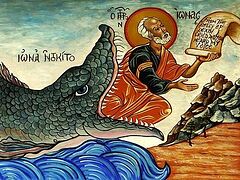 Job and his friends. Artist: Vladimir Borovikovsky. Around 1810
Job and his friends. Artist: Vladimir Borovikovsky. Around 1810
“Thy will be done”—everyone is familiar with this saying. Christians use it in a broad context, both to the point and beside the point. In the majority of cases, this saying is used when we speak about a specific situation. For example, someone has been diagnosed with cancer. He says, “God’s will be done.” With this, he admits that his illness is a part of God’s Providence about him and he humbly accepts it. But if it is more or less clear with illnesses, how about the evil deeds committed by man? For example, can we say, “Thy will be done” upon learning that five thousand three hundred Palestinian children were killed during the fifty days of bombing? Because it would be the same if we said that God wanted it to happen. But does God really want this? And if not, why does it happen?
The Holy Fathers were always careful about separating the concepts of the will of God and permission of God
Let’s start by saying that the Holy Fathers were careful about separating the concepts of God’s will and the permission of God.
“We ought to believe with firm faith that nothing at all happens in the world without God, but that everything happens either by His will or by His permission, namely: All good things take place by His will and with His assistance, while the opposite happens exclusively because He permitted it to happen, when God’s protection forsakes us due to our impurity and hardness of heart, and permits (but never favors.—Fr. R.) the devil or unrighteous fleshly passions to play the tyrant over us,” writes St. John Cassian the Roman.
Therefore, John Cassian strictly separates the will of God and His permissive will. St. John Damascene holds to the same view:
“Of those things which are subject to Divine Providence, one is by benevolence (by will), the other through condescension (by permission). What is by benevolence (will) is unquestionably good; as for condescension (permission), there are many types of it.”
Next, he enumerates many examples of the God’s permission: the righteous suffering of afflictions, the tribulations of saints, trials that excite envy in the soul of another man, falling into ungodly acts, etc.
Besides, who would dare to attribute the sins and all kinds of evil things going on in the world to the will of God? God Himself says that He hates the lawless deeds of men (Revelations 2:6). Here we inevitably come across such an important factor as man’s free will. Why did Adam succumb to sin? Is it possible that the Lord really wanted this to happen, and did He really will it so? No! Adam willed it to happen, not God. However, God allowed it to happen by virtue of the inviolability of man’s free will. St. John Damascene says of this:
“Of that which is in our own power, God firstly wishes and approves good deeds. But He does not wish evil deeds, either before they are committed or afterwards, but leaves it to the free will (of man).”
God allowed evil to happen by virtue of the inviolability of man’s free will
If we admit that God deigns evil to act in the world, He inevitably seems to us to be a terrible being Who rejoices at the suffering and death of His creation. For God made not death: neither hath he pleasure in the destruction of the living (Wisdom of Solomon 1:13). While the Apostle John the Theologian explicitly states that the principles this world is based on, namely, the lust of the flesh, the lust of the eyes and the pride of life exist not because of the will of the Father, but according to the will of the sons of men: It is not of the Father, but is of this world (1 John 2:16).
True, the Lord has said: In the world ye shall have tribulation (John 16:33). But one thing is tribulation for the sake of Christ and His teaching, and another the destruction of the soul. In view of this, temptations must also be discerned. The Apostle James said of the temptations that harden our faith: My brethren, count it all joy when ye fall into divers temptations (James 1:2). It is quite another thing when the temptations threaten the death of the soul. Even the Lord Himself commanded us to pray for deliverance from these dreadful temptations: “And lead us not into temptation...”
Nevertheless, the world is replete with grim examples of the manifestation of the so-called “will of God.”
-
Why do monks perish: when they are seduced, when they hang themselves, throw themselves into cliffs, fire, or wells? Can this truly be the manifestation of God’s will?
-
Why do millions of unbaptized babies die before being born? Is this the will of God?
-
Why do huge numbers of people, including children and civilians, perish in countless wars, and so-called social evils? Is this the will of God as well?
-
Why do corrupt judges condemn the innocent to death and acquit the guilty, thus allowing wide room for countless acts of evil? Could this, and so many other things, happen according to the will of God?
Certainly, there is no will of God in all this whatsoever nor can there be, as many saints have told us. Still, all this does happen. It means that it happens according to some other principles and spiritual laws. What we have here is the permissive will of God. Someone may recall here the words of the Savior: Are not two sparrows sold for a farthing? and one of them shall not fall on the ground without your Father (Matthew 10:29). However, this is not about God favoring the death of birds, but about Divine Providence. He counts all hairs on our head and He is aware of every bird’s death, no matter how small it is. St. John Chrysostom supports this thought:
“Thus, lest they should think, when killed and maimed, that they suffered this as men forsaken, He introduces again the argument of God’s Providence. For what is viler than they? says He; nevertheless, not even these shall be taken without God’s knowledge. Yet even they cannot be caught without the knowledge of God. He does not say that they fall by the assistance of God (that is unworthy of God); but only that nothing happens that is unknown to Him.”
“And yet not one of them (sparrows) falls into the net without God—certainly not by His assistance, but by permission” (Euthymius Zigabenus).
Whoever admits that there is the will of God in the destruction of men’s souls and bodies forgets the words of Christ: Even so it is not the will of your Father which is in heaven, that one of these little ones should perish (Matt. 18:14). There is no will of God for this to happen, said the Lord. But it happens anyway.
A Chosen Vessel of God also confirms the idea that there is not only God’s will, but also satan’s, which the Lord allows to act in the world. He writes in his Epistle to the Thessalonians: Wherefore we would have come unto you, even I Paul, once and again; but Satan hindered us (1 Thess. 2:18). Now let’s hear how Blessed Theophylact of Bulgaria interprets this passage:
“What are you saying? That satan forbids? It is true, for it wasn’t the work of God. In the Epistle to the Romans it says that God hindered (Rom. 1:13, 15, 22), and Luke says that they were forbidden of the Holy Ghost (Acts 16: 6, 7) and in the Epistle to the Corinthians he says that it was the work of the Spirit (2 Cor. 1:22). Here, however, it is simply said that it is the work of satan, who brings powerful and sudden temptations, certainly by the permission of God.”
One seemingly can’t be more convincing. We can read about satan’s doings in the world in greater detail in the Book of Job.
Therefore, we find in the Holy Scriptures and the holy fathers that these two concepts must be strictly separated and never confused with each other. Based on the above, we can formulate two definitions:
The will of God is what God favors, what He wants and desires and what He promotes. It is generally the good deed and the right thing. This is the will of God, even your sanctification (1 Thess. 4:3).
The permission of God is what God doesn’t wish, but He allows to happen by force of certain circumstances (usually it is the free will of man).
God never favors evil. Ye shall be holy; for I am holy… For I am the LORD your God (Lev. 11:44). But He can ever wisely turn evil into good and make evil work for good. However, be that as it may, He always remains an enemy to evil. The patriarch Joseph had confirmed this: But as for you, ye thought evil against me; but God meant it unto good, to bring to pass (Gen. 50:20). In other words, God allowed it to happen. For what Joseph’s brothers were doing when they wanted to kill him (they threw him into a well and sold him into slavery) cannot ever be the will of God. Joseph called these actions of his brothers evil, and evil cannot ever be attributed to the benevolence of God. “God will never allow evil to happen unless much good can come out of it” (St. Paisios the Athonite). At the same time, it by no means removes responsibility from men: Woe to that man by whom the offence cometh! (Matt. 18:7).
As a result, let us not be dim-witted people, who upon learning about a certain act of evil, will automatically say, “God’s will be done.” The concept of sin prevailing over the world can in no way be identified with the will of God. The will of God, the good and perfect (Rom. 12:2), has never positioned itself behind a wicked or criminal guise. He that committeth sin is of the devil; for the devil sinneth from the beginning (1 Jn. 3:8). The world lieth in evil not because God wants it, but because sin-loving man wants it.



